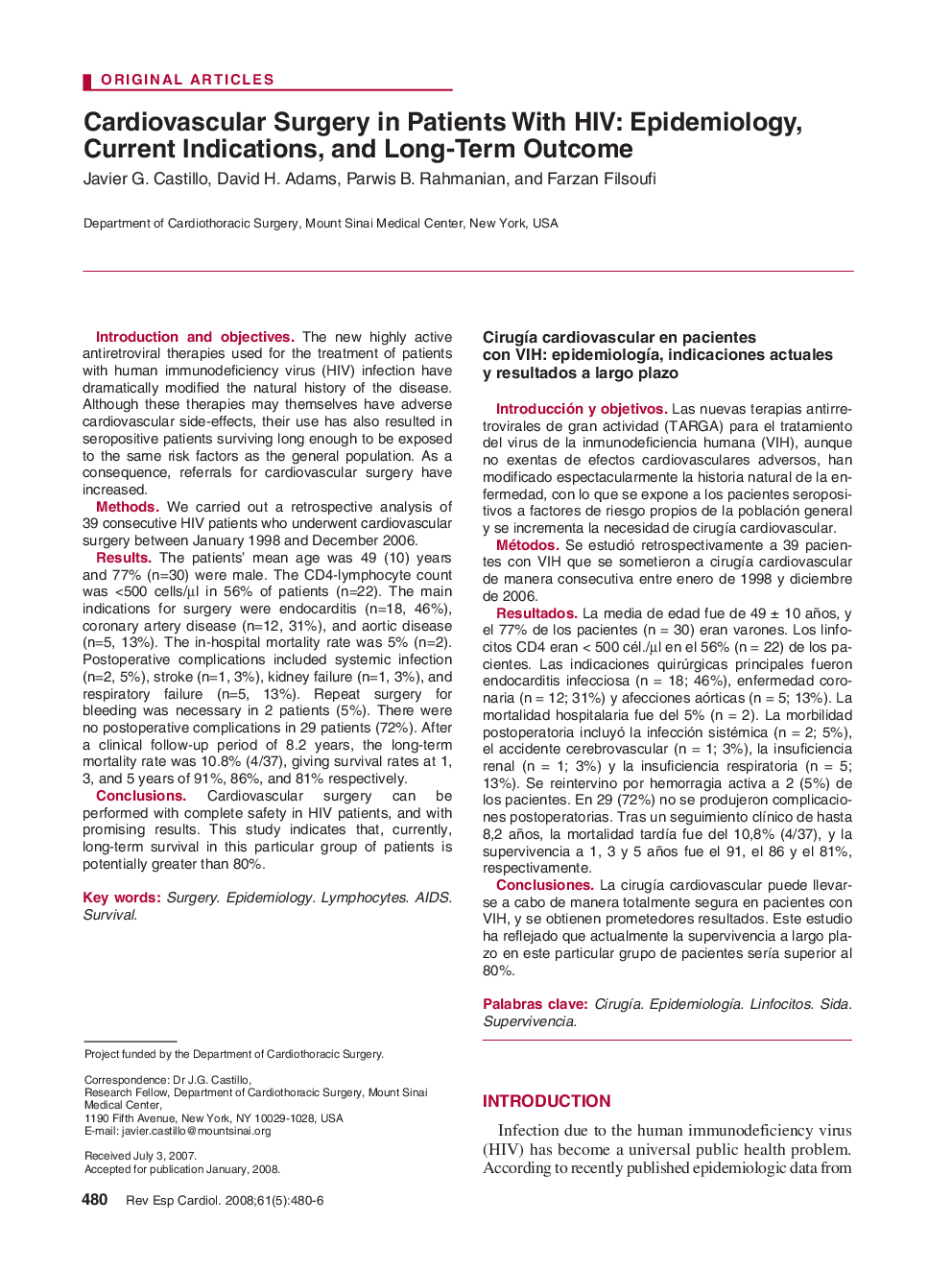| کد مقاله | کد نشریه | سال انتشار | مقاله انگلیسی | نسخه تمام متن |
|---|---|---|---|---|
| 3019264 | 1182203 | 2008 | 7 صفحه PDF | دانلود رایگان |

Introduction and objectivesThe new highly active antiretroviral therapies used for the treatment of patients with human immunodeficiency virus (HIV) infection have dramatically modified the natural history of the disease. Although these therapies may themselves have adverse cardiovascular side-effects, their use has also resulted in seropositive patients surviving long enough to be exposed to the same risk factors as the general population. As a consequence, referrals for cardiovascular surgery have increased.MethodsWe carried out a retrospective analysis of 39 consecutive HIV patients who underwent cardiovascular surgery between January 1998 and December 2006.ResultsThe patients' mean age was 49 (10) years and 77% (n=30) were male. The CD4-lymphocyte count was <500 cells/μl in 56% of patients (n=22). The main indications for surgery were endocarditis (n=18, 46%), coronary artery disease (n=12, 31%), and aortic disease (n=5, 13%). The in-hospital mortality rate was 5% (n=2). Postoperative complications included systemic infection (n=2, 5%), stroke (n=1, 3%), kidney failure (n=1, 3%), and respiratory failure (n=5, 13%). Repeat surgery for bleeding was necessary in 2 patients (5%). There were no postoperative complications in 29 patients (72%). After a clinical follow-up period of 8.2 years, the long-term mortality rate was 10.8% (4/37), giving survival rates at 1, 3, and 5 years of 91%, 86%, and 81% respectively.ConclusionsCardiovascular surgery can be performed with complete safety in HIV patients, and with promising results. This study indicates that, currently, long-term survival in this particular group of patients is potentially greater than 80%.
Introducción y objetivosLas nuevas terapias antirretrovirales de gran actividad (TARGA) para el tratamiento del virus de la inmunodeficiencia humana (VIH), aunque no exentas de efectos cardiovasculares adversos, han modificado espectacularmente la historia natural de la enfermedad, con lo que se expone a los pacientes seropositivos a factores de riesgo propios de la población general y se incrementa la necesidad de cirugía cardiovascular.MétodosSe estudió retrospectivamente a 39 pacientes con VIH que se sometieron a cirugía cardiovascular de manera consecutiva entre enero de 1998 y diciembre de 2006.ResultadosLa media de edad fue de 49 ± 10 años, y el 77% de los pacientes (n = 30) eran varones. Los linfocitos CD4 eran < 500 cél./μl en el 56% (n = 22) de los pacientes. Las indicaciones quirúrgicas principales fueron endocarditis infecciosa (n = 18; 46%), enfermedad coronaria (n = 12; 31%) y afecciones aórticas (n = 5; 13%). La mortalidad hospitalaria fue del 5% (n = 2). La morbilidad postoperatoria incluyó la infección sistémica (n = 2; 5%), el accidente cerebrovascular (n = 1; 3%), la insuficiencia renal (n = 1; 3%) y la insuficiencia respiratoria (n = 5; 13%). Se reintervino por hemorragia activa a 2 (5%) de los pacientes. En 29 (72%) no se produjeron complicaciones postoperatorias. Tras un seguimiento clínico de hasta 8,2 años, la mortalidad tardía fue del 10,8% (4/37), y la supervivencia a 1, 3 y 5 años fue el 91, el 86 y el 81%, respectivamente.ConclusionesLa cirugía cardiovascular puede llevarse a cabo de manera totalmente segura en pacientes con VIH, y se obtienen prometedores resultados. Este estudio ha reflejado que actualmente la supervivencia a largo plazo en este particular grupo de pacientes sería superior al 80%.
Journal: Revista Española de Cardiología (English Edition) - Volume 61, Issue 5, 2008, Pages 480-486